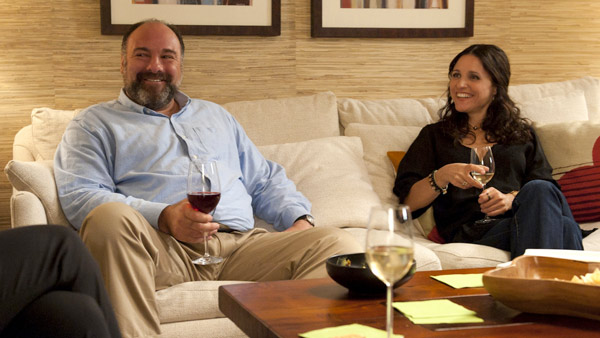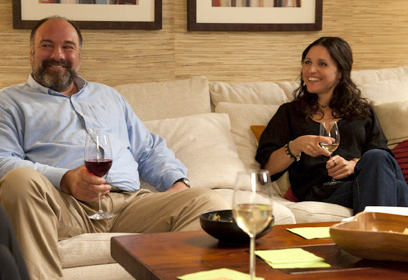
The charming film Enough Said stars Julia Louis-Dreyfus and the late James Gandolfini as middle-aged, star-crossed lovers. Neither of these talented actors, who give compelling performances, was a likely candidate for feature-film stardom: Louis-Dreyfus is no Hollywood beauty, and Gandolfini is bald and obese. Both earned their acting credentials and reputations on television. Louis-Dreyfus, primarily a comedienne, was a regular on many long-running television series of the past two decades—from Saturday Night Live to Seinfeld to Curb Your Enthusiasm. Gandolfini rose to international fame on The Sopranos as the mafia boss in psychotherapy.
If these actors lack Hollywood glamour, they have another, perhaps more engaging quality on the big screen: they seem like our old friends. We empathize with them, we feel their pain, and we want them to be happy. Although they have no sexual chemistry in Enough Said and seem an unlikely couple, they were brilliantly cast. Both their characters are pushing 50, divorced, and have an only child, a daughter, going off to college. Can they hazard yet another relationship?
Enough Said is the fifth feature film of auteur Nicole Holofcener. Like her other films and Holofcener herself, it is singularly unpretentious. Enough Said seems to be a slice of her own life made into art. But what makes Enough Said and her other films worth watching are the glimpses they give into the human condition. Her themes are psychological and social, pursued from a female point of view and with a droll sense of humor: What happens to the intimacy of two women who are best friends when one of them gets married? How do relationships evolve after the mother of a white family adopts a black child? What do those who are comfortable in life owe of their time and money to charity? Her aperçus of upper middle-class life are unlikely to interest either the targeted fifteen-year-olds of major feature films or the cineastes looking for an ambitious avant-garde creation. Still, when I went to see the opening of Enough Said at an art house theater, I waited in a long line of people over 50. Most of us knew that Gandolfini had died of a heart attack in Rome shortly after he finished the film. Should we have felt sad? Were we paying our last respects? Or did his death add a frisson to the event? No one seemed to know.
The film touches on what most psychotherapists believe is the greatest problem of middle-class American women: loneliness and the absence of love. Who is there waiting to be with you when you come home from work? Now that you have a career, where is the promised haven in the heartless world? How does the dream of romantic love survive multiple relationships and one-night stands? What can one hope for after divorce when even middle age is slipping away? This is the situation in which Louis-Dreyfus’s Eva, a masseuse, finds herself. Her occupation seems to dramatize her loneliness, with all of its loveless, intimate physical contact. We first see her hauling the heavy and bulky case of her massage table out of the trunk of her car. She can barely manage it. And the clients themselves provide a series of comic miseries: the obese man, encouraged to exhale, does so and noxiously right in her face; the middle-aged woman talking a blue streak about herself; the healthy young man at the top of his long narrow stairway who never offers to help as Eva labors awkwardly up the stairs with her table. All these are sight gags, and Louis-Dreyfus’s expressive face and body language say everything. Eva’s career is not providing her much emotional satisfaction. Adding another dimension of loss to Eva’s emotional burden, her daughter, Ellen (Tracey Fairaway), is about to leave for college.
Who is there waiting to be with you when you come home from work? What can one hope for after divorce when even middle age is slipping away?
Single and divorced mothers often compensate for their failures in romantic love by looking for love and intimacy with their children. This is what Eva seems to have done, and now her daughter, less needy and more mature than her mother, is preparing for the separation that college will bring. The love-hungry Eva responds by mothering her daughter’s best friend Chloe (Tavi Gevinson). Women stealing the love of other people’s children is a real phenomenon rarely depicted in film. Holofcener scripts it with deft psychological strokes to show us why Chloe might respond to Eva’s attention. In one scene Chloe’s mother tries on the same dress as her daughter, competing with her and caught up in her own vanity, refusing to act like a mother. We understand why Chloe begins to hang around Eva’s home even when Ellen is out. Chloe, a virgin, begins confiding in Eva. They talk about whether Chloe should sleep with her boyfriend, whom she really likes. Should she get it over with? Perhaps she should wait? Eva leaps in with both feet ready to advise Chloe that it might be wise not to miss out on this experience.
Eva has a good heart but poor psychological judgment, and does not know how to get what she wants out of life. She seems to sabotage herself again and again. She does have a friend who stands by her, Sarah (Toni Collette), a neurotic psychotherapist who wrangles with her husband, has an intense, ambivalent emotional relationship with her maid, and is constantly rearranging the furniture in her home. That her maid is more important to her psychic health than her husband is another of Holofcener’s droll glimpses into the quotidian lives of well-to-do women.
Sarah and her discontented husband take Eva off to a cocktail party where she meets two people who will become the focus of her search for love. First she meets Marianne (Catherine Keener, who has been in all of Holofcener’s films), who apparently has all of the style and self-confidence that Eva lacks and is a potential massage client. What is more, she is a poet, and Eva is almost abject in her admiration. Next she meets Gandolfini’s Albert, to whom she tactlessly announces that she is not attracted to a single man at the party. Instead of taking offense, Albert remarks that he feels the same way about the women there. The spark of a connection is made through humor. As she leaves the party with the prospect of a new client in Marianne and a new male relationship in Albert, she does not know that the two are exes.
Holofcener herself is separated from her husband; she is writing about a world she knows. The film is set in West Los Angeles, where almost everyone owns their own homes, where housekeepers are crucial to family life, and where divorce and wounded narcissism are rampant. Holofcener explores the vicissitudes of relationships between women with an almost Chekhovian sensibility. One might think that Eva’s budding relationship with Albert would be all-important to her. But she is in thrall to Marianne, who is a personal friend of Joni Mitchell and has no cellulite. It turns out that Marianne, with all her accomplishments and celebrity status—she is recognized on the streets—is almost as lonely and eager for friendship as Eva. Marianne, a perfectionist, ventilates all her negative feelings about her ex-husband to Eva, and she poisons Eva’s mind on all the familiar issues: he is clumsy in bed, awkward socially, and disorganized in his day-to-day affairs. Before she realizes Albert is Marianne’s ex-husband, Eva is quite pleased with him, and he with her. But she comes to see him through Marianne’s eyes. The budding romance ends in a quarrel, with Albert saying that he feels like he just spent the evening with his ex-wife. And he has; such is Marianne’s influence on her acolyte Eva.
It seems that the ultimate disaster of loneliness has struck: a resentful Albert has rejected her; the daughter she loves goes off to college; and the mother whose daughter she stole rebukes her, reclaims her daughter, and accuses her of being a dyke. But this is a comedy. When Eva hits bottom she figures things out. On Thanksgiving Day, the holiday most fraught for divorced families, Eva drives to Albert’s home, parks outside, and waits. He looks out the window, their eyes meet, and, again, love—though improbable—is possible. We leave the theater with smiles on our faces. In the adventure of life, love is still the happy ending.
Photograph: Fox Searchlight Pictures






